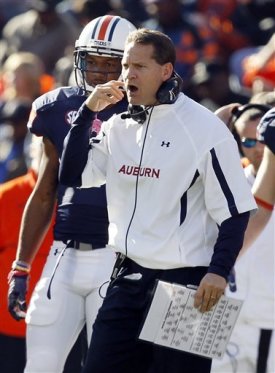Academic fraud: Three players say that before the BCS Championship game the team was told that as many as nine of their teammates would not be able to play in the title game because they were academically ineligible. “We thought we would be without Mike Dyer because he said he was one of them, but Auburn found a way to make those dudes eligible,” says Mike Blanc, a teammate and roommate of Mike McNeil’s. Before the season, McNeil says he was given an F for attendance in a computer science. “I had B work but I missed too many classes; and I went to the instructor and said, ‘I really need this grade,’” says McNeil. “He said that he was sorry but he wouldn’t change it. I went to the person over him. She was in a position of power and backed up the instructor. I then told my counselor with the athletic department.” Within days, McNeil says, the grade was changed from an F to a C and he did not miss a game.
Payments to players: Receiver Darvin Adams, a star player with NFL dreams and a family to support, wrestled with whether to turn pro after the championship season. He discussed his plans with teammates and told them how much pressure he was under by Auburn coaches to stay. McNeil and Blanc say Auburn coaches offered Adams several thousand dollars to stay for his senior year. “It was sugar-coated in a way,” says Adams, who confirmed he was offered financial incentives, but declined to detail the exact amount. “It was like, we’ll do this and that for you. But I’d rather do things the right way. I am happy I didn’t say yes to that stuff. That’s what I’d tell kids.” Adams turned pro but went undrafted, a result, one NFL scout says, was due to negative reports on him from Auburn coaches. Adams plays for the Toronto Argonauts of the Canadian Football League and refuses to be bitter. “I play the cards I’m dealt,” he says. Other players tell stories of in-season cash payments to players. “Coaches would say, ‘Don’t tell anyone where you got it from,’’’ says Blanc. McNeil recalls having a difficult day at practice in 2007 and then-defensive coordinator, Will Muschamp, calling him into his office. “I had no clue what it was about because I’d never directly asked him for anything,” says McNeil. “He slid about $400 over to me. He went into a drawer and gave me money and said, ‘Is this enough? Is this good?’ And I said, ‘Yeah, I’m good.’” Muschamp, now the head football coach at the University of Florida, denied the payment through a spokesperson.
“I had no clue what it was about because I’d never directly asked him for anything,” says McNeil. “He slid about $400 over to me. He went into a drawer and gave me money and said, ‘Is this enough? Is this good?’ And I said, ‘Yeah, I’m good.’”
Recruiting violations: The NCAA allows less than $50 a day to be spent by student-athlete recruiters on visiting prospects but McNeil recalls coaches giving him $500 to entertain blue-chip player Dre Kirkpatrick, one of the top prep players in the country in 2008. “This is how it goes: Coaches have certain players that they trust. And when I say trust I mean on the field and off the field,” says McNeil. “It’s within the family. It’s within the system. If I’m a star player and I’m a likable person, and a recruit comes in at my position, then, of course, I’m going to take him under my wing. … If a star recruit was in town, you would get a lot more than the NCAA limit.” As Thorpe said, “A special recruit was treated like a king.”






